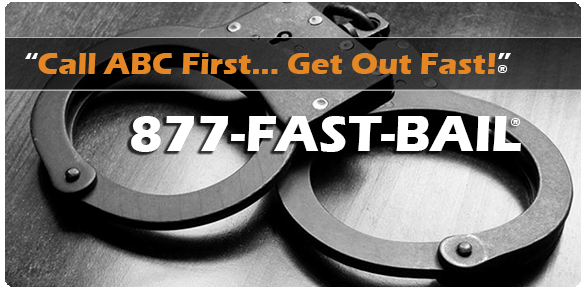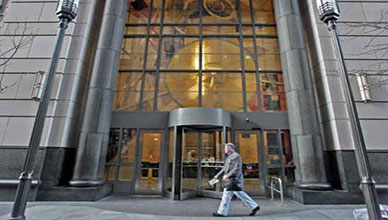The Bail Bonds Process
A bail bond is a guarantee or security made in exchange for the release of a person who was arrested and is in jail. Bail agreements allow people the benefit of staying out of jail while they fight their case and await trial. It is not possible to post bail once a person has been sentenced. A person who is out on bail may continue to work and meet other family or social obligations.
Step 1: Call ABC Bail Bonds
– The very first step in the bail process is talking with a bail bondsman from our reputable bail bonds agency. A bail bondsman will ask you for information such as your name, date of birth, charges and which jail you are currently residing. Once the information is gathered, you can move on to step 2.
Step 2: Select A Bond Type
– The second step in the bail bonds process is to select which type of bail bond works best for you. There are several types which may be available to you depending on your charge, previous record and location. Once you have selected a type of bail bond, the bondsman will process your bond and inform you of any costs and fees applicable and you can move on to step 3.
Step 3: Make A Payment And Go Home
– Once a small percentage of the bail amount has been paid (usually 10% depending on location) your bail will be posted and you can return home to your family and loved ones. Once you are released, do not drink, consume drugs or commit crimes. Also make sure you make it to every single one of your court and legal appointments. If you keep your nose clean and keep all scheduled court appearances and appointments through your trial, then your bail bond amount will be returned to the bond agency and it will be considered paid. You will not be obliged to pay off the bond in full. However, should you break the law while out on bail or miss court dates, then you may be responsible for the entirety of the bond.
The Basics Of Bail Bonds
If you were to pay a full bail amount directly to the court, you could exhaust your savings. With bail bond companies, you can pay a fraction of the bail amount instead. For example, you’d pay around $5,000 on a $50,000 bail amount instead of the full balance. Since the process of going to the court to post bail directly is both complicated and expensive, most people choose the route of using a bail company. When you do this, the bail arrangement is a surety bond.
There are three parties involved in a bail bond contract, which include the obligee, obligor and principal. As defined in N.Y. CPL. LAW § 500.10, the principal is the defendant or the person who bail will be posted for. The obligor is the party carrying out the process of posting bail. An obligee is a third party who may also be responsible for the arrangement. If you are making a bail arrangement and paying for a friend or family member to get out of jail, you are the obligee. The bail company is the obligor, and the bail bondsman is your agent who will post bail with the court on your behalf.
How Bail Is Determined By The Court
When a person is arrested, he or she typically has a legal right to bail in all states. Initial bail is usually determined during booking. The bail amount may be altered at the judge’s discretion if the defendant requests a bail hearing or requests a reduction during arraignment. The arraignment is the defendant’s first court appearance after being arrested where the formal charges are stated. As outlined in Pa.R.Crim.P. 521, the only exception for granting bail to a defendant is if the offense is punishable by life imprisonment or death. This means that people who are charged with murder or similar serious offenses cannot be granted bail. According to Nolo, a person who has an active warrant in another jurisdiction at the time of arrest may be held without bail. This is to keep that person custody to also answer to the other jurisdiction.
People who commit misdemeanors or felonies that would not result in life sentences or capital punishment will qualify for bail. The bail amount is determined by the severity of the crime and the amount of charges. For example, consider two people who are arrested together for breaking into a business and stealing merchandise. The first person is charged with three counts of shoplifting. The second person is charged with possession of a loaded firearm, two counts of shoplifting and evading arrest. The second person’s bail amount would likely be higher.
Types Of Bail Arrangements
Rule 520 under Title 234 of the Code of Criminal Procedure for Pennsylvania outlines how bail is set. If bail is allowable, Rule 524 outlines the types of permitted bail releases. Police usually follow guidelines for setting bail at booking. Courts and judges use other factors such as employment, criminal history, community ties, family, education and similar criteria for setting bail amounts or determining which type of arrangement to allow. The following paragraphs outline the different bail agreement options.
- Release On Recognizance
This type of arrangement is typically abbreviated as ROR. It means that a judge will release the defendant on his or her own merit. The person is released with the judge’s trust that he or she will make all required court appearances voluntarily. ROR is typically granted to first-time offenders who do not commit serious crimes, and it may be granted to people who honored ROR agreements in the past. If it is denied, bail is set on the basis of money or special conditions. - Release On Non-Monetary Conditions
With this type of arrangement, the defendant will be released without having to pay money. He or she must comply with other types of requirements. Some examples may be keeping a job, finding a job, staying in school, not drinking or doing drugs, checking in with police or a similar requirement. This is typically used for misdemeanor or non-violent offenses and is also common with juveniles. This agreement can be used in addition to a monetary condition. - Release On Unsecured Bail Bond
This type of agreement may also be combined with another one at the judge’s discretion. With an unsecured bail agreement, the defendant signs a contract stating that he or she will be liable for a certain amount if required court appearances are not made. - Release On Nominal Bail
Release on nominal bail is a midpoint between ROR and monetary conditions. However, the difference is that a defendant will pay less. In Pennsylvania, a person who has been in jail for a long period of time awaiting trial can request nominal bail. The amount has to be low enough that the defendant can afford to pay it and get out. For example, a judge may reduce an initial bail of $80,000 to $10,000 cash bail. The defendant would pay $10,000 to get out. - Release On A Monetary Condition
If the defendant’s charges qualify for bail under Title 234 of the Code of Criminal Procedure, the bail amount will remain the same as it was at booking or will be adjusted. In some cases, a fractional bail bond may not be accepted by the court. The judge may instead require the defendant to post cash bail, which means that he or she must pay the full amount to the court in order to be released. Cash bail is typically used when a defendant may be a flight risk, which means that the defendant may not be likely to appear in court as required. In this case, the defendant forfeits the entire amount if he or she does not appear in court. However, the money may be returned if all appearances are made as required.
The Bail Bonds Process: Putting The Puzzle Together
Now that you understand bail agreements, how bail is set and what a bail bond is, it is time to put the puzzle together by understanding the steps of the process. The first step should always be to contact a licensed bail company. At ABC Bail Bonds, our licensed and capable agents have been helping people get out of jail faster for over a decade. If you are helping a family member or friend get out of jail, a bail agent will meet with you to collect the basic information about the defendant. We need a name, address, basic personal details, a booking number and the name of the facility where the defendant is being held. If you are not sure about the facility name or the person’s booking number, you can call the local sheriff’s department.
If you plan to post collateral bail using real estate or other property, you must contact the Court of Common Pleas. We only handle surety bond agreements and can help you set up an affordable arrangement. At ABC Bail Bonds, we also handle out-of-state transfer bonds. When you sign the agreement, you are making yourself a guarantor. This means that you are guaranteeing the appearance of the defendant in court. If he or she does not appear, you will be liable for the full bail amount. However, you owe nothing other than the specified percentage of the bail amount if the defendant makes all required court appearances. Since you are making yourself a liable party as well, it is crucial to make sure that the defendant appears in court. You can do this by offering to go with the defendant or take him or her to court.
Once the papers are signed and payment has been made, we arrange for your friend or family member to be released immediately. Our bail agents handle the tasks of filing the paperwork with the court. As the defendant makes required court appearances, we ask that you update us with future court dates. We track the progress of the case to make sure that you and the defendant uphold the agreement. When the defendant has been sentenced or the case has been dismissed, the bail agreement is satisfied. We are available 24 hours each day to answer questions or set up arrangements. If you are ready to set up a bail arrangement, please call one of our friendly knowledgeable agents to get started.













